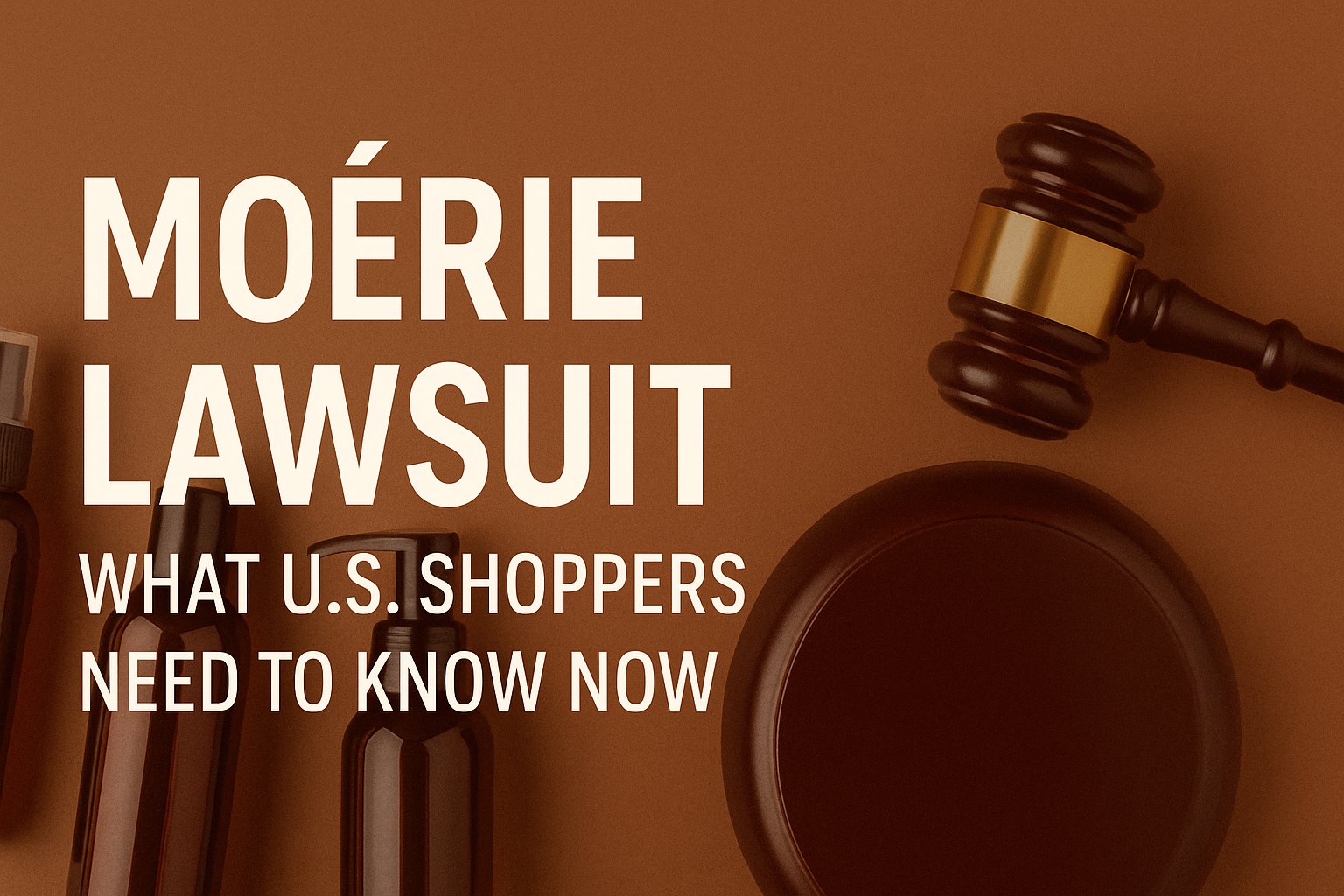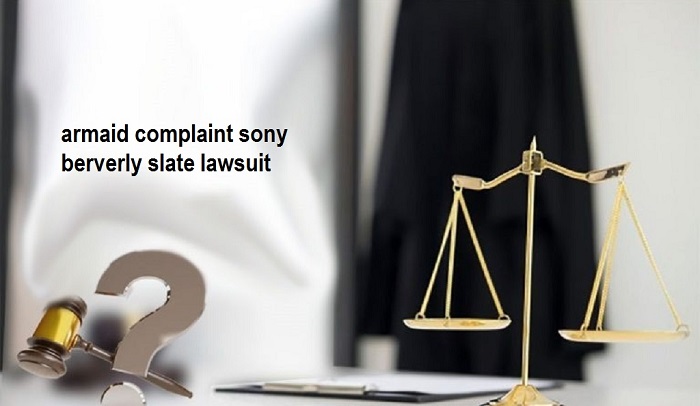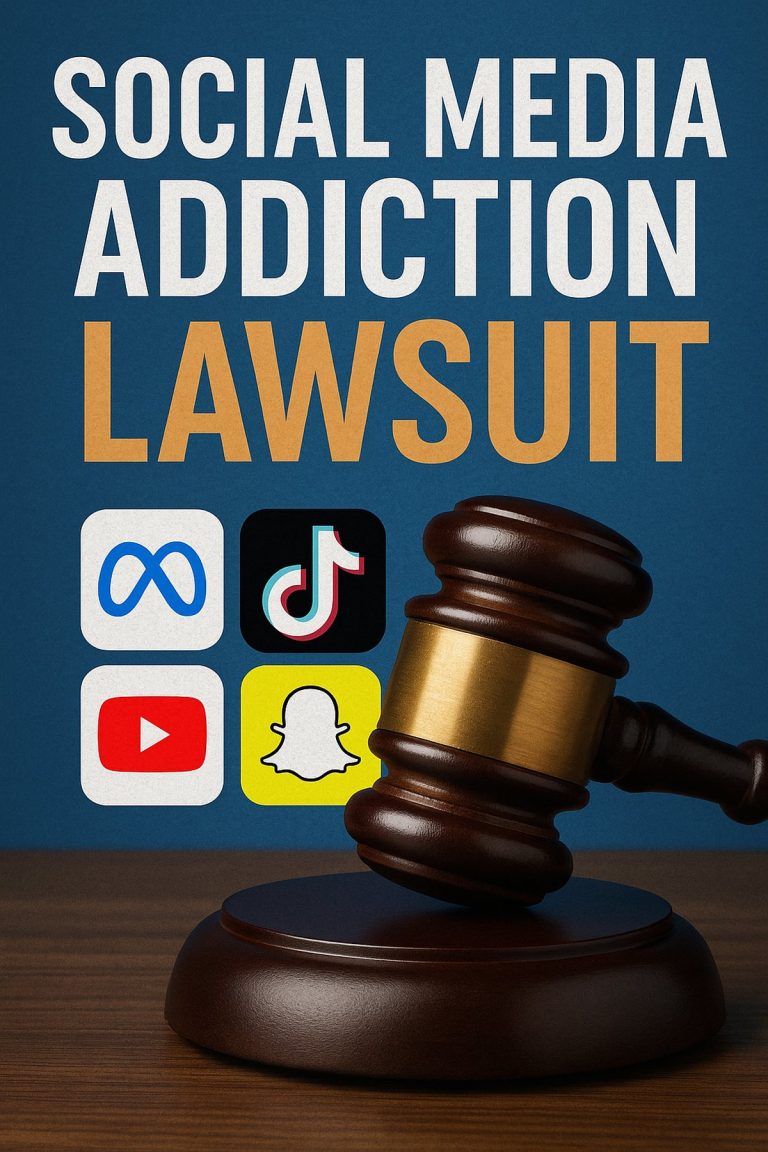The Moérie lawsuit conversation is growing louder each week. Social feeds buzz with questions. Customers wonder whether the brand’s luxury hair products are safe and whether they are honestly marketed. Many have seen alarming posts about hair loss or sneaky subscription charges. Some even believe a major court case is already underway.
Right now, there is no official lawsuit on record. Still, the chatter matters. Complaints and legal speculation highlight real consumer concerns. Understanding the facts helps shoppers make wise choices and stay alert as events unfold. Before we explore allegations and potential legal actions, it is helpful to understand the company behind the headlines. Let’s meet Moérie and see how it rose to fame in the crowded hair-care market.
Meet Moérie: The Brand Behind the Buzz
Origins and Rapid Growth
Moérie began in Europe and manufactures its products in Lithuania. The brand quickly entered the U.S. market, registering a business entity in Delaware to reach American customers. Online sales, influencer partnerships, and eye-catching ads powered its expansion. Within a few years, Moérie moved from niche mineral treatments to a recognizable name on beauty blogs and social channels.
These growth tactics built excitement but also drew scrutiny. As the customer base expanded, so did questions about product claims and billing practices. Those early doubts set the stage for today’s controversy.
Signature Products and Big Claims
Moérie markets mineral-rich shampoos, conditioners, and hair-growth serums. The company promotes benefits such as faster growth, thicker strands, and stronger roots. Its website highlights rare “earth minerals” and natural extracts. Influencers on TikTok and Instagram rave about visible results in weeks.
These bold statements helped Moérie capture attention in the competitive hair-care world. But firm promises also create risk. When results fall short or unexpected reactions occur, customers speak out. Those voices eventually shaped the allegations now tied to the Moérie lawsuit buzz.
How Concerns Started
From Rave Reviews to Rising Doubts
Moérie entered the U.S. beauty scene to applause. Influencers shared glossy videos of fuller hair and quick growth. Early buyers left five-star ratings on popular retail sites. Excitement built as the brand promised results that seemed almost magical.
Then the mood began to shift. Customers started posting about unexpected side effects and slow customer service. Some individuals reported scalp irritation or a sudden increase in hair shedding. Others complained that the expensive products failed to deliver any visible change. A few mentioned unexpected charges that appeared after the initial order was placed. These stories spread quickly across social media and review platforms. Word-of-mouth praise turned into skeptical questions. That change drew the attention of consumer-protection watchers and curious law firms. The move from praise to suspicion created fertile ground for serious allegations.
Let’s explore the primary locations where these concerns emerged and how they influenced public perception.
Complaints Across Review Platforms
Consumer-review sites captured the first big wave of discontent. On Trustpilot, mixed ratings replaced the initial positive reviews. Positive reviews still appear, but negative posts stand out. Customers report trouble getting refunds or canceling subscriptions. Some users report that their hair felt weaker or developed an itchy scalp after weeks of use.
ComplaintsBoard and the Better Business Bureau (BBB) echo these concerns. Threads detail repeated attempts to contact customer service. Buyers describe confusion over recurring monthly charges. Others say they received different products than they ordered. While these are personal accounts, rather than verified legal evidence, they reveal patterns that can attract the attention of lawyers and regulators. Public forums also magnify every story, making the brand appear riskier than before.
This wave of consumer frustration opened the door to formal allegations. Next, we’ll break down those allegations in detail and see why they fuel the ongoing “Moérie lawsuit” buzz.
Allegations: What People Are Saying
The word “lawsuit” keeps surfacing because many customers share serious concerns. These concerns fall into several categories: product safety, marketing claims, and billing practices. Below, each area is explored in detail to show why shoppers and lawyers are paying attention.
Product-Related Allegations
Some customers believe Moérie products caused hair and scalp problems. Reports describe itching, redness, and unusual shedding after weeks of use. A few people report noticing more hair loss than before starting the regimen. These experiences remain personal anecdotes. No peer-reviewed studies have proving a direct link between Moérie formulas and hair loss. Still, in the court of public opinion, even a small cluster of similar stories raises an alarm. Dermatologists note that several factors can trigger hair shedding, including stress, dietary changes, or hormonal shifts. That complexity makes it challenging to determine which product is the culprit. Yet repeated consumer reports keep this allegation alive.
Marketing and Labeling Allegations
Critics say Moérie advertising promises more than science can deliver. The brand highlights “earth minerals” and “proven growth results,” terms that sound powerful but lack published clinical backing. Some customers feel misled by phrases such as “guaranteed growth.” U.S. and EU cosmetic rules require honest marketing. Companies cannot claim benefits without evidence. If a court were to find that Moérie exaggerated its claims, it could face penalties for false advertising. These marketing concerns contribute to the broader legal discussion. They also fuel customer frustration when expectations are not met.
Billing issues form the third major group of allegations, and they directly affect wallets.
Billing and Subscription Disputes
Many complaints focus on recurring charges. Buyers describe signing up for a one-time order, only to discover a subscription plan has been added. Others say cancellation was confusing or that charges continued after they believed they had ended service. This practice, known as “negative-option billing,” is a legal gray area if the terms are unclear. The U.S. Federal Trade Commission (FTC) actively investigates companies that hide or obscure subscription details. If investigators confirm that Moérie failed to present clear terms or made cancellation difficult, the brand may face fines or be required to provide refunds.
Finally, a different kind of allegation has emerged—law-firm recruitment aimed at potential plaintiffs.
Law-Firm Recruitment and Public Buzz
At least one U.S. plaintiff-side law firm has published a blog calling Moérie a possible scam. The post invites consumers to share their stories and join a potential lawsuit. This does not mean a case is filed. It signals that lawyers see potential for a class action if enough evidence surfaces. Such solicitations can spread quickly online. They often amplify consumer anxiety and create the impression that a court fight is inevitable, even when no claim has been made yet.
How Allegations Feed the “Moérie Lawsuit” Narrative
Together, these products, marketing, and billing allegations shape the current conversation. They keep the phrase “Moérie lawsuit” trending even though no judge has opened a case. They also attract media attention and pressure regulators to take a closer look.
Now that we understand the allegations, it’s time to examine the actual legal status and the hurdles anyone would face in turning these claims into a real lawsuit.
The Legal Reality of this hair-care lawsuit
Searches of U.S. court databases, including PACER, show no active filings. So, there’s no discovery, no hearings, and no settlement talks. This is important: a lawsuit starts only when a complaint is formally filed in court and accepted by a judge. So far, that has not happened. Still, consumer complaints and lawyer interest keep the risk alive. Here’s how the legal landscape looks if someone decides to move forward.
Current Status: No Filed Case
Legal databases reveal zero federal or state cases naming Moérie as a defendant. No public regulatory actions appear on the FTC or FDA websites. This means there is no discovery process, no courtroom hearings, and no settlement negotiations underway. The absence of a case does not erase consumer concerns. It simply means that, for now, all claims remain allegations rather than evidence before a judge.
Next, let’s examine the legal theories that could apply if a lawsuit is filed.
Possible Legal Theories
Consumer Protection and False Advertising
Each U.S. state enforces “unfair or deceptive acts or practices” laws. If Moérie’s marketing proves misleading—such as claims of guaranteed hair growth—state attorneys general could pursue civil action.
Federal Trade Commission Oversight
The FTC regulates deceptive advertising and negative-option billing. In case the agency finds Moérie made subscription terms unclear or cancellation hard, it may fine or order customer refunds.
Product Liability and Personal Injury
A product-liability suit will follow if a customer is able to establish that the product had caused injury. That entails medical records, expert testimony, and unmistakable evidence proving that Moérie formulas directly resulted in harm.
Even assuming these theories are plausible, their proof presents its own issues.
Regulatory Oversight
The FDA regulates cosmetic labeling and safety but does not pre-approve the products. It can intervene when products are adulterated or misbranded. State attorneys general may also initiate investigations if trends of consumer injury become apparent. Any of these agencies might intervene if there is evidence of risk or fraud.
Key Legal Hurdles
It is hard to prove a hair-care product led to hair loss. Shedding hair may be caused by diet, stress, or hormone changes. Courts demand scientific proof and expert witness that prove a direct connection. Gathering large quantities of documented incidents and laboratory tests would cost time and money. Without proof, the lawsuit could lose without entering trial.
Evidence Challenges and Possible Future Lawsuits
Even when charges read dire, making them a viable lawsuit is another matter altogether. Lawsuits are predicated on evidence, and that’s where matters tend to become messy.
The Evidence Problem
Hair loss or scalp irritation may result from an infinite number of causes. Shedding can result from stress, hormones, or pre-existing medical conditions. There must be hard data and expert testimony before courts will conclude that a product harmed someone. Proof like that takes funds and time. Everyone’s hair type, health, and environment are unique and difficult to dissect for a single source. Without a firm paper trail, a case will probably never make it past the first court obstacle.
Due to these obstacles, lawyers considering a class action must carefully consider their strategy and potential costs.
What Could Trigger Real Litigation
Several developments could push this situation toward a genuine Moérie lawsuit.
Cluster of Documented Reactions
If many verified customers report the same medical issues with matching timelines, lawyers gain a firmer footing.Independent Lab Results
Tests revealing harmful ingredients or contamination would attract regulators and plaintiffs.Whistleblower Evidence
Internal emails or research showing that the company was aware of the risks could spark action.Regulatory Investigation
An FTC or state attorney general probe might expose billing or advertising violations, creating momentum for civil suits.
These triggers could move the dispute from online complaints to a courtroom.
Possible Outcomes if a Case Emerges
Class Action Settlement
A group of consumers could sue together. If a court certifies the class, Moérie might choose to settle. Settlement could mean refunds, revised labeling, or reformulated products.
Regulatory Consent Decree
The FTC or a state agency could negotiate a settlement requiring clear subscription terms and strict advertising rules.
Dismissal or No Action
If the evidence remains weak, a judge may dismiss the complaint. Sometimes, cases never start because lawyers are unable to gather sufficient evidence.
Timeline Expectations
Even if a lawsuit is filed tomorrow, resolution takes years. Discovery, expert reports, and negotiations can stretch well beyond the public’s initial attention. Customers should not expect quick answers or immediate refunds unless regulators step in first.
Smart Steps for Consumer Protection
Even without a filed Moérie lawsuit, shoppers can protect themselves. Taking a few simple steps today can save headaches if new problems arise.
Track Every Purchase
Save every email confirmation and shipping notice. Hold on to packaging, including lot numbers and expiration dates. If a reaction occurs, these details provide important evidence. A simple folder—digital or paper—makes future claims easier. It also helps you track exactly what you ordered and when it was delivered.
Solid records become vital if regulators or lawyers request proof of purchase.
Monitor Your Health
Watch your scalp and hair after each wash. Note any irritation, itching, or unusual shedding. Take photos if you see changes. Visit a dermatologist if problems persist. A medical record strengthens any future claim and protects your health.
Personal health logs provide doctors and investigators with clearer information if a case ever develops.
Report Issues Promptly
Use the FDA Cosmetic Adverse Event Reporting portal for health concerns. Contact your state consumer-protection office to log complaints. Submit a Better Business Bureau (BBB) report for billing or service problems. These reports create a public record. They also alert agencies that patterns might exist.
The more documented complaints appear, the more likely regulators will examine Moérie closely.
Handle Subscriptions Carefully
Log in to your account to turn off auto-renewals. Ask for a written acknowledgement of cancellation. Check your credit card accounts every month to detect and solve surprise charges early on. Challenge any unauthorized fee with the bank the moment you see it. Moving swiftly safeguards your funds and contributes to the paper trail.
Keeping on top of subscriptions avoids most billing woes before they get out of hand.
Assess Future Beauty Purchases
Look up ingredients and for third-party lab tests. Read lots of customer feedback—good and bad—before purchasing. Be wary of marketing that is too good to be true.
These habits keep you educated, instead of being influenced by glitzy marketing or influencer buzz.
Frequently Asked Questions About the Moérie Lawsuit
Is there an actual Moérie lawsuit right now?
No. Searches of federal and state court databases show no filed lawsuit against Moérie as of September 2025. The current buzz stems from consumer complaints and a law firm blog seeking potential plaintiffs.
What are the main allegations about Moérie products?
Customers report scalp irritation, increased shedding, and ineffective results. Others claim misleading “guaranteed growth” marketing and unexpected recurring charges.
Could Moérie face legal action in the future?
Yes. If regulators find evidence of false advertising or harmful ingredients, a case could emerge. A class action might also develop if many verified injuries are documented.
Who regulates hair-care products like Moérie?
The FDA oversees the safety and labeling of cosmetics. The FTC investigates deceptive marketing and negative-option billing practices. State attorneys general can also enforce consumer-protection laws.
How can I protect myself when using Moérie products?
Keep receipts, save packaging, and monitor your hair and scalp. Report any issues to the FDA, BBB, and your state consumer-protection office. Review your credit card statements to identify and cancel unwanted subscription charges.
What should I do if I think I’ve been harmed?
Discontinue use of the product and consult a dermatologist. Document symptoms and gather purchase records. For legal options, consult a licensed attorney.
7. Conclusion: Moérie Lawsuit Facts in One Place
The talk of a Moérie lawsuit shows how quickly consumer concerns can capture attention. Posts about hair loss and surprise charges spread across social media and review sites. Law-firm blogs added fuel, inviting customers to join a potential case. These developments created a sense that a courtroom battle was already underway. Right now, no official lawsuit exists. Searches of federal and state court records confirm that no judge is reviewing evidence. Regulators have not announced investigations.
Still, the allegations remain severe enough to keep shoppers’ alert. U.S. consumers deserve honest marketing and safe products. Moérie’s promises of guaranteed hair growth face questions that could invite regulatory review if credible evidence surfaces. Billing complaints about recurring charges may also draw the attention of the FTC. Future litigation is possible if patterns of harm, strong lab tests, or whistleblower revelations appear. Until then, the story is about caution and preparedness, not an active trial. The best move for shoppers is to be vigilant. Document purchases, monitor health reactions, and report any problems to official agencies. Stay informed through reputable sources, such as the FTC, FDA, and the PACER court database. Ignore sensational rumors that lack verifiable proof. The conversation around a Moérie lawsuit is far from over. It will evolve as consumers, regulators, and possibly courts examine the facts. Being proactive keeps you protected and ready for whatever comes next.
Disclaimer
This article shares publicly available information and consumer tips only. This is not legal advice and does not establish an attorney–client relationship. Readers experiencing health issues are advised to consult a licensed medical professional. Anyone seeking legal guidance should speak with a qualified attorney. Details reflect public information as of September 2025 and are subject to change without notice.
Ayesha Awais is a content writer for JudicialNexus.com, covering accident reports, injury-related news, lawsuits, and public safety updates. All content is informational in nature and based on publicly available sources.




